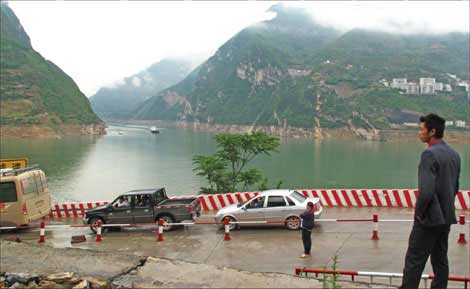Trouble in the gorges
Updated: 2011-06-03 11:11
By Hu Yinan (China Daily European Weekly)
 |
|
Passengers wait for ferries in Guizhou town of Hubei province to take them to Maoping, the new county seat of Zigui county, in late May. Maoping sits about a kilometer from the Three Gorges Dam. Hu Yinan / China Daily |
China's largest hydroelectric project facing resettlement, ecological challenges
For years, Wang Xiaoyun, 42, has not felt like going anywhere outside her hometown in central Hubei province. There is nowhere to go. Sitting on a low stool all day in her roadside grocery store doesn't make business better, but all she can do is hope for an occasional passer-by on this side of the deep Xiangxi River. Wang fondly remembers when the river was so shallow that she could walk across it as an 11-year-old. But those memories are gone.
Guizhou town, the seat of Zigui county until 1998, went underwater in 2003 when the area behind Three Gorges Dam became a lake. Zigui's new county seat, Maoping, sits about a kilometer east of the dam. About 100,000 people were relocated here (40,000 from Guizhou alone), and the Xiangxi River now runs about 15 meters deep.
Very few among those who moved to higher ground north of the river bother to take one of the 10 daily ferries south to Maoping, about a 10-minute ride. For them, Zigui, which boasts 3,200 years of history and birthed the character behind the June 6's Dragon Boat Festival, is no longer the same.
'Particularly poor'
The Three Gorges Dam, the world's largest hydroelectric project, covers 20 districts and counties along the Yangtze River and a population of 29.4 million.
This is a vulnerable crowd. Eleven of the localities were recognized by the State as "particularly poor" in 2002. The reservoir area's per capita GDP was only 40 percent of the national average, according to the Chongqing Migration Bureau.
On May 18, the State Council, China's Cabinet, announced for the first time that "problems that demand prompt solutions exist" in the project's resettlement of residents, ecological protection, and prevention and control of geological disasters. The project's follow-up plan says that by 2020, those resettled as a result of the dam should expect to have living standards similar to residents in Hubei province and Chongqing municipality, which the reservoir spans.
About 1.3 million people have been resettled since 1993, fewer than 20 percent of them outside the reservoir area. The rest had to move to higher ground. The plots there are smaller and, because the slopes are unstable, most are ill suited to farming.
With limited access to arable land, compensation, preferential policies, education and transportation, many are still struggling in sheer poverty.
E-paper

Pearl on the Yangtze
Wuxi is considered a town of natural beauty and its motto is "city of water and warmth".
Prose and consternation
Riding on a mystery train
Way of a warrior
Specials

Wealth of difference
Rich coastal areas offer contrasting ways of dealing with country's development

Seal of approval
The dying tradition of seal engraving has now become a UNIVERSITY major

Making perfect horse sense
Riding horses to work may be the clean, green answer to frustrated car owners in traffic-trapped cities
